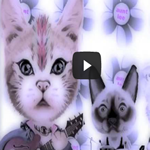
This video is an example of verbal irony and is suitable for use in high school lessons on the topic. Verbal irony is when a speaker intentionally says one thing and means another. From the first line, "My ride don't need no hand nor eye" we get the idea -- obviously, driving a car requires the driver to use eyes and hands. It's also sung by kittens trying to look tough and failing. My personal favorite line is "Physics don't apply to me," which is technically irony but is so completely believed by most teens that it should probably be carefully pointed out as an example of irony.
- Situational irony: The disparity of intention and result; when the result of an action is contrary to the desired or expected effect.
TAking a step back, we get an example of situational irony: the kittens are trying to convince you it's cool to text and drive, but the net effect will likely be the opposite.
The song also explicitly addresses another literary device - hyperbole -- which the kittens define as "makin' a point by exaggeratin.'"
In the preface, we learn a bit about the origins of the word "decimating": in Roman armies, decimating was a punishment meted out to soldiers, where one in ten was executed. Use of the term decimating is an exaggeration; it's not true that one in ten is being executed by texting drivers, though I did find the statistic that teens who text while driving spend 10% of their time outside of the car lane they are supposed to be in.
The Who references: The melody of this public service announcement/satire is The Who's 1965 "My Generation." It's a song about youthful rebellion -- the kittens try to emulate this tough rebellion and get everything absolutely wrong -- for one thing, it's Roger Daltrey, not Mick Jagger. The most famous line in the original song is "hope I die before I get old" -- the final line of Decimatin' My Generation is "Hope you get old, man, hope you get old."
The Public Service Announcement angle of the song works on the premise that teens, especially, don't fear death much but do fear embarrassment.
TAke another step back and we may get all the way to dramatic irony -- the very old books often used in English class as illustrations for irony are now available for free with very new technology. An alien observing students in English classes would see dramatic irony in the fact that very new technology is bringing about the result of students reading very old books.
Note: Interestingly, several of the stories often used in units on irony are available as free e-books; you can simply download them and email them to your students, who can then read them on their iPads: "The Gift of the Magi," by O. Henry, "The Necklace," by Guy de Maupassant, and "The Monkey's Paw," by W. W. Jacobs, and "The Cask of Amontillado," by Edgar Allen Poe. Also, "A Modest Proposal," by Jonathan Swift - I can still remember the shock and confusion I experienced reading this in an irony unit in high school a thousand years ago. Search for them at Aunt Lee's Obsessive Search for Free E-Books.
- CCSS.ELA-Literacy.RL.11-12.6 Analyze a case in which grasping a point of view requires distinguishing what is directly stated in a text from what is really meant (e.g., satire, sarcasm, irony, or understatement).
